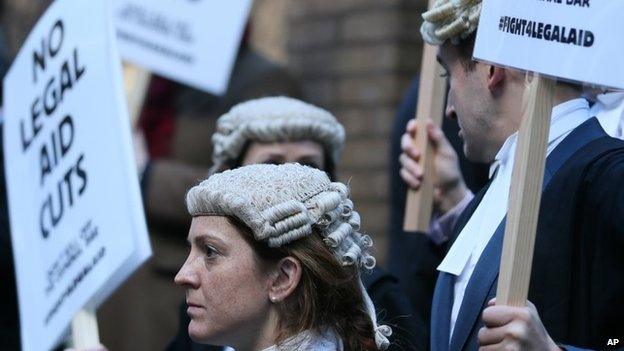Legal aid reforms: Solicitors lose duty contracts challenge
- Published

Lawyers have protested outside Parliament in response to the planned legal aid reforms
Solicitors have lost a legal challenge against government plans to cut by more than half the number of duty lawyers attending magistrates' courts and police stations in England and Wales.
Solicitors' associations warn that cutting the number of contracts from 1,600 to 527 will lead to inadequate access to legal advice for defendants.
But judges in London's High Court ruled the plans were not legally flawed.
The Ministry of Justice said savings had to be made in the legal aid system.
In the High Court on Wednesday, Lord Justice Laws and Mr Justice Cranston rejected all grounds of challenge to the Ministry of Justice proposals.
But they gave the solicitors time to seek an appeal to the Court of Appeal.
'Nail in coffin'
The Law Society described the ruling as "a deeply disappointing judgement" but said the fight would go on "for access to proper legal representation for anyone accused of a crime".
Society president Andrew Caplen said: "Access to legal advice is a fundamental human right, the absence of which undermines our society.
"We consider there to be an unacceptably increased risk that those accused of crimes, some of whom are the most vulnerable in our society, will have inadequate access to legal representation."
He said there was a risk that "large areas of the country could be left without legal representation".
He added: "We will continue to campaign for an effective, publicly funded defence system to prevent the risk of a sharp increase in miscarriages of justice."
In a joint statement, Bill Waddington, chairman of the Criminal Law Solicitors' Association, and Jonathan Black, president of the London Criminal Courts Solicitors' Association, said the proposed changes would be "a further nail in the coffin for access to justice for vulnerable people".
The bodies have also warned that "many firms have been considering their future" and that lawyers risk losing their jobs.
'No choice'
Welcoming the judgement, a Ministry of Justice (MoJ) spokesman said: "Anyone suspected of a crime will still have access to a legal aid lawyer of their choosing, just as they do now."
The MoJ says that the legal aid system, prior to its reform, was one of the world's most expensive at a cost of £2bn a year - and will still be "very generous" at about £1.5bn a year.
"Given the financial crisis inherited by this government, we have no choice but to find savings in everything we do," the department spokesman said.
"Our reforms are designed to ensure the system is fair for those who need it, the lawyers who provide it, as well as the taxpayers who ultimately pay for it."
It was this time last year that the government announced its plans to cut the number of firms doing duty solicitor work in magistrates' courts and police stations.
It is part of what the Ministry of Justice has said is reform of the criminal legal aid system to ensure it is "sustainable".
Chris Grayling, the Lord Chancellor and Justice Secretary, has faced vehement opposition to the plans from lawyers, including strikes and protests outside Parliament.
- Published23 January 2015

- Published4 June 2013
